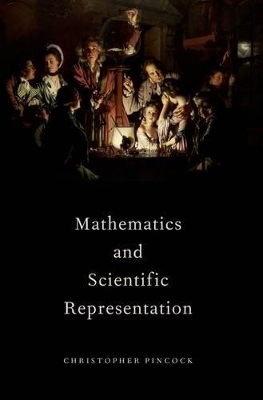
Mathematics and Scientific Representation
Oxford University Press Inc (Verlag)
978-0-19-020139-5 (ISBN)
Mathematics plays a central role in much of contemporary science, but philosophers have struggled to understand what this role is or how significant it might be for mathematics and science. In this book Christopher Pincock tackles this perennial question in a new way by asking how mathematics contributes to the success of our best scientific representations. In the first part of the book this question is posed and sharpened using a proposal for how we can determine the content of a scientific representation. Several different sorts of contributions from mathematics are then articulated. Pincock argues that each contribution can be understood as broadly epistemic, so that what mathematics ultimately contributes to science is best connected with our scientific knowledge.
In the second part of the book, Pincock critically evaluates alternative approaches to the role of mathematics in science. These include the potential benefits for scientific discovery and scientific explanation. A major focus of this part of the book is the indispensability argument for mathematical platonism. Using the results of part one, Pincock argues that this argument can at best support a weak form of realism about the truth-value of the statements of mathematics. The book concludes with a chapter on pure mathematics and the remaining options for making sense of its interpretation and epistemology.
Thoroughly grounded in case studies drawn from scientific practice, this book aims to bring together current debates in both the philosophy of mathematics and the philosophy of science and to demonstrate the philosophical importance of applications of mathematics.
Christopher Pincock received his Ph.D. in philosophy from the University of California, Berkeley in 2002. After eight years at Purdue University, he recently joined the philosophy department at the University of Missouri as an Associate Professor.
1 Introduction ; 1.1 A Problem ; 1.2 Classifying Contributions ; 1.3 An Epistemic Solution ; 1.4 Explanatory Contributions ; 1.5 Other Approaches ; 1.6 Interpretative Flexibility ; 1.7 Key Claims ; I Epistemic Contributions ; 2 Content and Confirmation ; 2.1 Concepts ; 2.2 Basic Contents ; 2.3 Enriched Contents ; 2.4 Schematic and Genuine Contents ; 2.5 Inference ; 2.6 Core Conceptions ; 2.7 Intrinsic and Extrinsic ; 2.8 Confirmation Theory ; 2.9 Prior Probabilities ; 3 Causes ; 3.1 Accounts of Causation ; 3.2 A Causal Representation ; 3.3 Some Acausal Representations ; 3.4 The Value of Acausal Representations ; 3.5 Batterman and Wilson ; 4 Varying Interpretations ; 4.1 Abstraction as Variation ; 4.2 Irrotational Fluids and Electrostatics ; 4.3 Shock Waves ; 4.4 The Value of Varying Interpretations ; 4.5 Varying Interpretations and Discovery ; 4.6 The Toolkit of Applied Mathematics ; 5 Scale Matters ; 5.1 Scale and ScientificRepresentation ; 5.2 Scale Separation ; 5.3 Scale Similarity ; 5.4 Scale and Idealization ; 5.5 Perturbation Theory ; 5.6 Multiple Scales ; 5.7 Interpreting Multiscale Representations ; 5.8 Summary ; 6 Constitutive Frameworks ; 6.1 A Different Kind of Contribution ; 6.2 Carnap's Linguistic Frameworks ; 6.3 Kuhn's Paradigms ; 6.4 Friedman on the Relative A Priori ; 6.5 The Need for Constitutive Representations ; 6.6 The Need for the Absolute A Priori ; 7 Failures ; 7.1 Mathematics and Scientific Failure ; 7.2 Completeness and Segmentation Illusions ; 7.3 The Parameter Illusion ; 7.4 Illusions of Scale ; 7.5 Illusions of Traction ; 7.6 Causal Illusions ; 7.7 Finding the Scope of a Representation ; II Other Contributions ; 8 Discovery ; 8.1 Semantic and Metaphysical Problems ; 8.2 A Descriptive Problem ; 8.3 Description and Discovery ; 8.4 Defending Naturalism ; 8.5 Natural Kinds ; 9 Indispensability ; 9.1 Descriptive Contributions and Pure Mathematics ; 9.2 Quine and Putnam ; 9.3 Against the Platonist Conclusion ; 9.4 Colyvan ; 10 Explanation ; 10.1 Explanatory Contributions ; 10.2 Inference to the Best Mathematical Explanation ; 10.3 Belief and Understanding ; 11 The Rainbow ; 11.1 Asymptotic Explanation ; 11.2 Angle and Color ; 11.3 Explanatory Power ; 11.4 Supernumerary Bows ; 11.5 Interpretation and Scope ; 11.6 Batterman and Belot ; 11.7 Looking Ahead ; 12 Fictionalism 413 ; 12.1 Motivations ; 12.2 Literary Fiction ; 12.3 Mathematics ; 12.4 Models ; 12.5 Understanding and Truth ; 13 Facades ; 13.1 Physical and Mathematical Concepts ; 13.2 Against Semantic Finality ; 13.3 Developing and Connecting Patches ; 13.4 A New Approach to Content ; 13.5 Azzouni and Rayo ; 14 Conclusion: Pure Mathematics ; 14.1 Taking Stock ; 14.2 Metaphysics . ; 14.3 Structuralism ; 14.4 Epistemology ; 14.5 Peacocke and Jenkins ; 14.6 Historical Extensions ; 14.7 Non-conceptual Justification ; 14.8 Past and Future ; Appendices ; A Method of Characteristics ; B Black-Scholes Model ; C Speed of Sound ; D Two Proofs of Euler's Formula
| Erscheint lt. Verlag | 25.12.2014 |
|---|---|
| Reihe/Serie | Oxford Studies in Philosophy of Science |
| Verlagsort | New York |
| Sprache | englisch |
| Maße | 171 x 231 mm |
| Gewicht | 503 g |
| Themenwelt | Geisteswissenschaften ► Philosophie ► Logik |
| Mathematik / Informatik ► Mathematik | |
| Naturwissenschaften | |
| ISBN-10 | 0-19-020139-8 / 0190201398 |
| ISBN-13 | 978-0-19-020139-5 / 9780190201395 |
| Zustand | Neuware |
| Haben Sie eine Frage zum Produkt? |
aus dem Bereich


